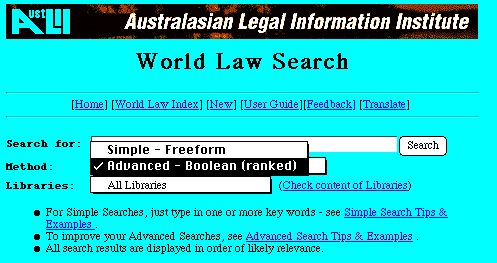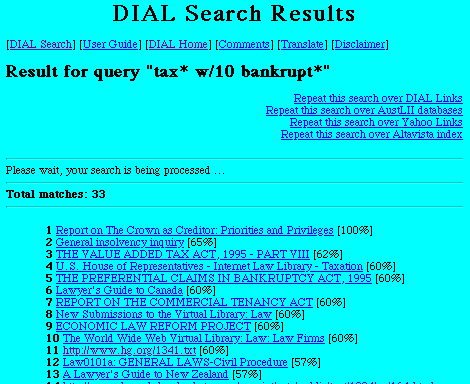[Previous]
[Next]
[Up]
[Title]
9. World Law Search - Full text remote search for law
World Law Search implements the targeted web spider. About 500 MB of targeted
sites have been indexed to date, providing searches over about 50,000 pages.
Because Project DIAL was used to test the web spider, targeting until now has
been largely limited to legislation and legislation-related sites, and to
indexes of law on the web. The targeted web spider will be used both in
relation to Australian legal materials and to create various collections of
international materials such as a world Indigenous Law Library, world Treaties
Library, and world Library of case law. These searchable international
collections will then become integral parts of other AustLII projects, such as
the Reconconciliation and Social Justice Library on indigenous law.
World Law Search uses the SINO search engine to search over all material
indexed by the targeted web spider. From the World Law Search interface shown
below, searches may be entered using boolean and proximity operators and
truncation.

The
World LawSearch interface, with `Advanced (Boolean Ranked)' selected
Two types of search/display options are provided:
- Simple - Freeform - Search - Users can enter text in any form (eg
`I want laws on tax and bankruptcy' or `tax taxation bankrupt bankruptcy')
without knowing about search connectors, truncation etc. Results are ranked
according to likely relevance. The user will obtain a useful list of search
results, although often not as complete as a boolean search can provide. This
is the search method recommended for inexperienced users, and is the default
option. (This is AustLII's Freeform (Ranked Results) search method.)
- Advanced - Boolean (Ranked) - Search - This is the most powerful
form of searching, where searches can be made using boolean and proximity
connectors, and the results are then also ranked in likely order of relevance.
This allows reasonably broad searches (to aid completeness) with the relevance
ranking then providing more precision. This display option is illustrated
below. (This is AustLII's Boolean (Ranked Results) search method.)
All
remote sites which are made searchable by World Law Search will be categorised
(at the time the web spider is sent to index them) into a `Library', a subset
of all of the searchable content. Two initial Libraries have been created, the
Legislation Library for DIAL (which is the default search scope for DIAL
Search), and the Law Indexes Library for World Law Search. Other content has
not yet been categorised into a Library. All of the searchable content (whether
or not in a specific Library as yet) is searchable under the All Libraries
option (which is the default option for World Law Search).
 `Law
Indexes Library' selected
`Law
Indexes Library' selected
The value of the Legislation Library is obvious: users who are
only looking for legislative models on a particular subject can restrict their
search to this Library.
The value of the Internet Indexes Library is that it allows searches in
relation to a topic or country that find the precise pages of links in the best
Internet law indexes that deal with the topic or country, so that users do not
have to go to the `front page' of each major index in order to determine, for
example whether the Library of Congress or Lexadin or FindLaw has a page for
Malaysia. This is illustrated by the first 10 items of 39 found in a search for
`Malaysia':

Other Libraries to be created include Law Reform, Law Journals, International
Agreements, Courts & Case Law, Indigenous Law, Industrial Law and Privacy
Law. Libraries on specific subject will usually be created only in order to
play a part in other projects. The result will be a valuable choice of
Libraries to allow more specific searching for all users.
A number of other methods of limiting the scope of searches are being
implemented in order to provide greater precision in search results.
World Law Search already has the capacity to limit searches to materials from
particular sites, and this has been implemented in a number of embedded
searches in World Law Index. This function allows World Law Search to be used
to search specific sites which have no search engine of their own, or have a
search engine which does not have the same features as the SINO search engine
used for DIAL Search.
An enhancement of this approach, which will allow users to select any site
which is searchable in DIAL Search and search only that site, is that the
 button in World Law Index which indicates that a site is searchable in World
Law Search will also be used to take the user to World Law Search with the
subsequent search scope limited only to that site.
button in World Law Index which indicates that a site is searchable in World
Law Search will also be used to take the user to World Law Search with the
subsequent search scope limited only to that site.
Also under development is an option on the World Law Search form which will
allow a user to limit the scope of a search to sites located in a particular
country, by use of that country's two letter country domain identifier (zm for
Zambia, vn for Vietnam, tr for Turkey etc). It will be very useful to be able
to search, say, over all law sites located in China, or in India.
When used in combination with limiting scope by Libraries, this will give a
very precise form of searching (eg `all Canadian legislation' or `all
Australian law reform materials'), but one which is broader than searching a
single site, and does not require the user to know in advance which sites exist.
As the range of non-English materials searchable in DIAL Search increases, it
is likely to become valuable to be able to limit searches to materials in a
particular language. This will probably be implemented by the indexer
indicating the language of non-English materials at the time of adding them to
World Law Search, with an option for users to exclude or include materials in
particular languages.
Results are displayed as shown below. Items are ranked in order of likely
relevance. The user is give the option to repeat the search over a number of
other systems.

The present method of displaying results relies upon the remote site attaching
informative titles to its HTML pages, as it is these titles that are displayed.
While most sites do achieve this to a reasonable degree (as can be seen from
the above example), some sites fail to provide any title at all, so that only
the URL of the site can be displayed in default (eg item 11 above). This is not
informative enough, so a number of alternatives are under consideration. One is
to display the first 50 words or so of the document, similarly to what is done
in Alta Vista. A second is to include the name of the database (added during
the indexing process) from which each entry comes, after the display of the
title, so it is at least easier to recognise which countries and systems
particular items are from. These choices have significant processing overheads,
and we are concerned not to unduly slow the delivery of search results.
Further utilisation of database and Library headings will make possible
additional display options which allow search results to be displayed grouped
by database of origin rather than by relevance ranking, in either long form or
short form[41].
One particularly effective use of World Law Search is to use it to find
starting points for research concerning the laws of a named country. Because
the relevance ranking tends to give short documents and documents that use a
search term in a title, many of the internet law indexes that have a separate
page for that country will appear near the top of the list, so the user can
they quickly review existing intellectual law indexes for that country.
Selecting `Repeat this search over DIAL links' will find the entries concerning
the country in AustLII's index.
 First
10 of 48 search results for `fiji*' over all Libraries
First
10 of 48 search results for `fiji*' over all Libraries
[41] These display options are currentl y
avaialable on AustLII as Boolean (Short Results) and Boolean (Long Rssults)
[Previous]
[Next]
[Up]
[Title]




 button in World Law Index which indicates that a site is searchable in World
Law Search will also be used to take the user to World Law Search with the
subsequent search scope limited only to that site.
button in World Law Index which indicates that a site is searchable in World
Law Search will also be used to take the user to World Law Search with the
subsequent search scope limited only to that site.

